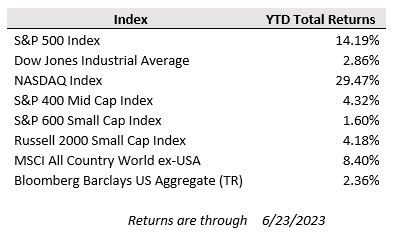U.S. equity markets took a breather last week from their recent surge as investor sentiment was hit by interest rate concerns and weakening economic data. For the week, the S&P 500 fell 0.8%, while the Dow Jones and Nasdaq Composite lost 1.0% and 0.6%, respectively. The pullback ended a five consecutive week stretch of gains for the S&P 500 and an eight-week win-streak for the Nasdaq as equities responded to subsiding fears regarding the debt ceiling standoff and systemic banking system fears and got a further boost from artificial intelligence enthusiasm.
Federal Reserve Chair Powell in his two-day testimony to the House and the Senate last Wednesday and Thursday, respectively, reiterated his expectations that more rate hikes will be needed this year to combat inflationary pressures. Moreover, central banks abroad also sent hawkish signals, with the U.K., Norway and Turkey all hiking rates. Fed Chair Powell reiterated the message that officials felt it was appropriate to take rates higher by year-end, noting that a 'strong majority' of the FOMC saw two additional hikes. He has been emphasizing the Fed’s hawkish June dot plot more than he did at the post-FOMC press conference in the week prior.
Economic data last week continued to show cooling in the economy, including the tight labor market, though employment remains on firm footing. Kansas Fed's composite index and manufacturing index readings for June worsened from the previous month, with the latter hitting levels that have been previously reached only in U.S. recessions. Meanwhile, the number of Americans filing for jobless claims remained at their highest since October 2021. The gradual slowdown in economic activity points to further softening of inflation pressures ahead, but the Federal Reserve is unlikely to take its foot off the brake until inflation sustainably returns to its 2% target.
On the geopolitical front, global markets are calm to start the week after a weekend of turmoil in Russia. There’s been no word from either President Vladimir Putin of Russia or his rebellious military chief-for-hire, Yevgeny Prigozhin, after Prigozhin’s attempted march on Moscow.
The week ahead will be headlined by the May release of the Fed’s preferred inflation gauge on Friday, the personal consumption expenditures (PCE) index, which is expected to show a deceleration in annual price growth from 4.4% in April to 3.8% last month. The latest consumer confidence report from the Conference Board and earnings from big consumer-focused companies will round out the picture on consumer spending trends. A central banker gathering will also be in the spotlight as the European Central Bank concludes its annual forum in Portugal. Central bank leaders, including Jay Powell of the Fed, Christine Lagarde of the E.C.B. and Kazuo Ueda of the Bank of Japan will discuss monetary policy there. The Fed is set to release the results of its annual bank stress tests, the first big report card on lenders since the collapse of Silicon Valley Bank.


